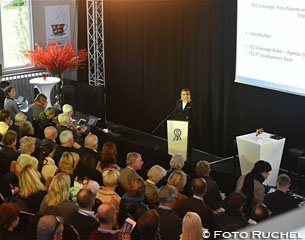
Surprise revelations from the FEI Dressage Committee and an interesting debate on sponsorship and media coverage for international dressage competitions marked the morning session on the first day of the 2016 Global Dressage Forum, beautifully and professionally hosted at Hof Kasselmann in Hagen, Germany, on 10 - 11 October 2016.
Even though the location of the Forum, which is traditionally held at Bartels Academy in Hooge Mierde, The Netherlands, had changed, its format untampered with. After an initial address by moderator Richard Davison, who was assisted by retired vaulting champion Kai Vorberg this year, and a speech from Princess Benedicte of Denmark, the Forum kicked off with the FEI Dressage Director's address with updates on what the FEI Dressage Committee has been working on behind closed doors this year.
2020 Olympic Format, Surprise Surprise
Only on the job for 10 days as new FEI Dressage Director after Carina Mayer's resignation, Bettina de Rham admitted that she was not yet as worked in as she had hoped to be, but the 45-year old was proficient enough in eloquently conveying the FEI's modus operandi of the year. The biggest task the FEI had been working on for dressage this year is developing a new format for the 2020 Olympics to make the sport more attracitve to modern day man, who has an attention span of 2 seconds, and incorporating more IT for an enhanced and more professional experience of the sport.
"The FEI Development tools need to make the discipline more spectator friendly and easier to understand," said De Rham. "We need to create heroes while keeping in mind the professionalism of the sport. "
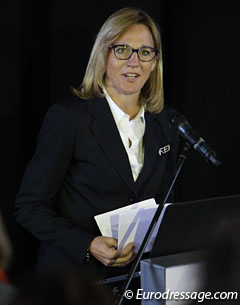 Bound to a small time slot in the GDF program, De Rham flew over the new Olympic format rule amendments as if the audience was completely current with the latest FEI Dressage Committee "jack-in-the-box" surprises which they are known to make for years.
Bound to a small time slot in the GDF program, De Rham flew over the new Olympic format rule amendments as if the audience was completely current with the latest FEI Dressage Committee "jack-in-the-box" surprises which they are known to make for years.
For the 2020 Olympics the FEI will be going back to a format of teams of three, like at the 2012 London Olympics. This was the only point that was not a surprise to the attendees as it had been communicated out in the open before. The rest were jaw-dropping revelations. Teams who are able to qualify a reserve rider to the Games will be able to use it as a joker for the Grand Prix Special, which the FEI funnily calls, "a strategic tool." The Grand Prix Special can be ridden to music. Riders can bring their own music track for their Special to support the test, but they will not be judged on it. This is purely for the spectator's entertainment. A special "heat system" will be applied for the Grand Prix to determine who can move on the the Special and Freestyle. "Lucky Losers" will be able to qualify for the Finals if they are not in teams. The starting list for the Grand Prix will be based on the World Ranking List.
De Rham listed all these changes at such a high speed that the brain was hardly able to cope with it in time for questions. Those who are not privileged to sit on the FEI Dressage Committee, hold a special IDRC/ IDTC board seat or are part of the intra mura working groups or their national federation's elite have tough luck. They will hear about the future of the sport at the Global Dressage Forum. The FEI's motto of transparency is pure lip service as everything is confidential and only discussed with those who are one-track mind yay-sayers.
Princess Haya once dissolved the FEI Dressage Committee (DC) in 2008 to put an end to what she believed was confidential scheming for personal interest and one-sided direction taking of the committee. The Dressage Task Force was established soon afterwards and it was the best functional committee so far, which honestly discussed its proposals and ideas sharing them out in the open with riders, press and interested partiers. The IDRC has always been a driving force for the improvement of the sport and initially they were transparent in the work they did with the Task Force. However, when the Dressage Committee was re-established they held a riot about having proper rider representation within the Dressage Committee and wasted much money on a lawsuit. It is regrettable to see that they are now part of the working groups collaborating with the DC and upholding an omerta about what is being decided for the sport. None of the IDRC board members were present at the 2016 Global Dressage Forum. It is not that the FEI Dressage Committee is not putting in much work, but this secrecy and confidentiality are getting beyond the point of the ridiculous. It is a pity that they deliberately choose the road of least resistance and so few people get to hear about the decisions on the direction of dressage before they are written down in stone at the FEI General Assembly.
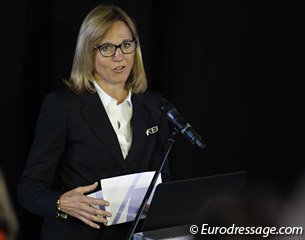 German team trainer Monica Theodorescu was asked her opinion on the 2020 Olympic format and she said she was "not happy to have three and a reserve rider" which will be to the detriment of one rider. However "we have to adapt to the IOC." She considered the heat system "a great idea" as it "might have a few surprises". For her it's most "to keep the original tests." When it comes to the joker/reserve rider Monica seemed equally puzzled: "we'll have to see how it works then in four years. It's not our first choice but we need to stay in the Olympics."
German team trainer Monica Theodorescu was asked her opinion on the 2020 Olympic format and she said she was "not happy to have three and a reserve rider" which will be to the detriment of one rider. However "we have to adapt to the IOC." She considered the heat system "a great idea" as it "might have a few surprises". For her it's most "to keep the original tests." When it comes to the joker/reserve rider Monica seemed equally puzzled: "we'll have to see how it works then in four years. It's not our first choice but we need to stay in the Olympics."
In 2009 German 5* judge Katrina Wüst presented her Degree Of Difficulty (DOD) project at the Global Dressage Forum and after a test project at the CDI Fritzens, the FEI is now running a pilot for the 2016-2017 Western European League World Cup Qualifiers. Based on Wusts and her business partner Daniel Göhlen's ideas, the freestyle floorplan creator has been made to determine a Kur's DOD. The German score company Hippodata has incorporated the system in their software and other show secretaries can follow.
De Rham also revealed that the FEI is re-opening the discussion about the judges' age limit. Hopefully the efforts of the two working groups that have been established - an Officials and Dressage Judges Working Group - will soon come to fruition, although Bettina did not disclose what they are exactly working on.
Eurodressage asked for a detailed overview of the proposed 2020 Olympic format, but De Rham told us that "we are currently still working on the final ideas to be presented at our General Assembly in November 2016."
Klimke & Kohl: Sponsorship and Media Coverage for Dressage Competitions
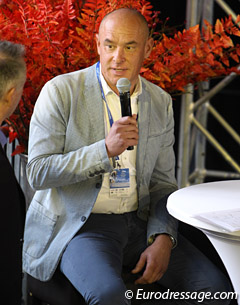 Probably the most interesting topic of the entire 2016 Global Dressage Forum was the second item on the agenda: "Sponsoring – a key to finance our sport?" The Forum brought together two experienced dressage show organizers, who have both hosted very different dressage shows and who both face the same issues. Grand Prix rider and lawyer Michael Klimke organizes two national dressage and show jumping competitions in Munster each year, while Edwin Kohl, who is a big pharmaceutical entrepreneur by professional, has hosted a very prestigious and posh CDI 4* at his Gestut Peterhof in Perl-Borg, Germany.
Probably the most interesting topic of the entire 2016 Global Dressage Forum was the second item on the agenda: "Sponsoring – a key to finance our sport?" The Forum brought together two experienced dressage show organizers, who have both hosted very different dressage shows and who both face the same issues. Grand Prix rider and lawyer Michael Klimke organizes two national dressage and show jumping competitions in Munster each year, while Edwin Kohl, who is a big pharmaceutical entrepreneur by professional, has hosted a very prestigious and posh CDI 4* at his Gestut Peterhof in Perl-Borg, Germany.
This year numerous international dressage competitions were cancelled because of sponsorship issues. Klimke and Kohl had a public brain storm session about the problems organizers face and made the crux pretty clear: "There are two systems. The system where the riders pay their way and the no-pay system, where you collect from sponsors to finance the show. But first you have to create the surrounding (to attract and appeal to sponsors), which is expensive, and only then you can find sponsors," both speakers stated. At Klimke's Munster shows they try to attract riders by not charging an entrance and stabling fee. "However, in Florida everyone pays much higher fees than anywhere else. You even pay for the vet check at a 5* star," Klimke stated.
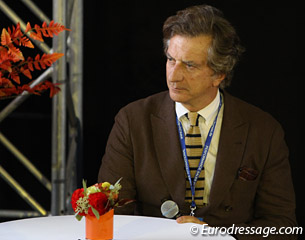 Klimke confessed that it costs 1.2 million euro to stage the show in Munster and they can barely pay good prize money to the riders. "In the old days 50% of the budget was prize money," Klimke added. Kohl picked up on that, "There is a big gap. The riders have the money, they arrive in 500,000 euro lorries with million euro horses at the show, but it is hard to sell a VIP table. We have to ask a bit of money of money (to be able to stage the show). The bigger our show got, the less money we were making. The readiness of contributing money to sport events is getting smaller, despite the booming economy in Germany."
Klimke confessed that it costs 1.2 million euro to stage the show in Munster and they can barely pay good prize money to the riders. "In the old days 50% of the budget was prize money," Klimke added. Kohl picked up on that, "There is a big gap. The riders have the money, they arrive in 500,000 euro lorries with million euro horses at the show, but it is hard to sell a VIP table. We have to ask a bit of money of money (to be able to stage the show). The bigger our show got, the less money we were making. The readiness of contributing money to sport events is getting smaller, despite the booming economy in Germany."
Moderator Richard Davison asked the speakers why sponsors are not seeing the commercial enterprise in it, to which Kohl replied, "dressage lacks glamour. We have it in show jumping, look at the Gucci Masters in Paris. They have famous riders and bring famous people to the show. They get the interest of the yellow press." Klimke jokingly added though that "I see more glamour in Charlotte Dujardin than Nick Skelton."
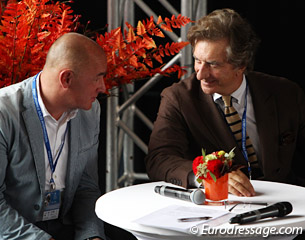 Klimke and Kohl both stated that the willingness for show organizers to host a beautiful show is certainly there, but they are asking for a little more co-operation from the riders. "We host a special evening for the local officials and some local politicians come. The riders don't even show up for it," said Klimke. Hickstead show organizer Dane Rawlins concurred and cited that "we once hosted a charity party and then a senior riders decided to have a private party at her house and had all the riders there. The riders turn up in their expensive horse boxes, but won't have a table at the show or even show up (for the parties)."
Klimke and Kohl both stated that the willingness for show organizers to host a beautiful show is certainly there, but they are asking for a little more co-operation from the riders. "We host a special evening for the local officials and some local politicians come. The riders don't even show up for it," said Klimke. Hickstead show organizer Dane Rawlins concurred and cited that "we once hosted a charity party and then a senior riders decided to have a private party at her house and had all the riders there. The riders turn up in their expensive horse boxes, but won't have a table at the show or even show up (for the parties)."
To keep the sport in full development show organizers not only need to cater to the needs of the rich riders and sponsors but they also have to take care of the less financially strong athletes, who also need to be drawn to events and fill the starters' lists. "I hope to organize a show that keeps the cost for the riders as small as possible to give everyone a chance," said Klimke. "We involve more amateur riders by allowing more entries and staging more classes. The local riding clubs can do a kur in Munster and it sells out for years. We are not just a small elite show with just the super stars. Like this we can generate more interest from new sponsors from these groups. As an organizer we are happy not to be bankrupt by Sunday evening." Kohl believes that for a high calibere international dressage event the riders can be charged. "If you come to a 5* you need to be able to pay 2000 euro entrance fee," he stated. Both agreed though that a combination would be ideal, a balance between sponsors and riders paying.
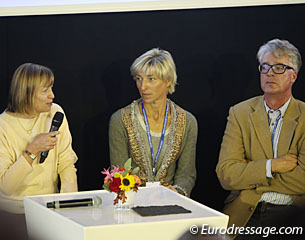 Ulf Möller, who assists in the PST and Hof Kasselmann staged equestrian events, drew the comparison with show jumping, where amateur riders get to ride an L and S-level class at international shows. They pay their way and get the opportunity to enjoy the atmosphere of a posh international equestrian show at a lower level. Möller also stressed the importance of the Welcome Evening they annually host at the Horses & Dreams CDI/CSI Hagen. "For the sponsors it's nice to see the riders dressed up and have the chance to talk to them instead of seeing them in their tail coats." Möller also highlighted the success of the Ankum Riding Club winter series. The indoor shows for all levels is open to amateurs and professionals, but there is a special amateur series of which the top 10 highest scoring riders get the chance to compete in a finals held during the CDI Hagen. "It would even be better to do this at an international level." Luxembourg judge Christoph Umbach, who has also hosted CDN and CDI shows in his country, remarked, "the amateurs only pay pay pay and the professionals cash it."
Ulf Möller, who assists in the PST and Hof Kasselmann staged equestrian events, drew the comparison with show jumping, where amateur riders get to ride an L and S-level class at international shows. They pay their way and get the opportunity to enjoy the atmosphere of a posh international equestrian show at a lower level. Möller also stressed the importance of the Welcome Evening they annually host at the Horses & Dreams CDI/CSI Hagen. "For the sponsors it's nice to see the riders dressed up and have the chance to talk to them instead of seeing them in their tail coats." Möller also highlighted the success of the Ankum Riding Club winter series. The indoor shows for all levels is open to amateurs and professionals, but there is a special amateur series of which the top 10 highest scoring riders get the chance to compete in a finals held during the CDI Hagen. "It would even be better to do this at an international level." Luxembourg judge Christoph Umbach, who has also hosted CDN and CDI shows in his country, remarked, "the amateurs only pay pay pay and the professionals cash it."
A highly interesting panel discussion followed with British Olympian Emile Faurie, journalist Evi Simeoni (Frankfurter Allgemeine Zeitung), German Olympian Ingrid Klimke, and Welf Konieczny (editor of the Sportschau, WDR German TV-program). The discussion involved the importance of television coverage for horse sport.
The CHIO Aachen is the best televised horse event of the year in Germany with 20 hours of direct tv-time. "The CHIO is a special show. It has the best riders in the world, the best stadium. It looks great, the sport is good. You have to create heroes, you have to create events. When you switch on the tv and see Aachen, you want to buy a ticket to be there," said Konieczny, adding that "dressage has a special interest group, jumping is easier. At other shows you don't have the same quality field to make it interesting for tv."
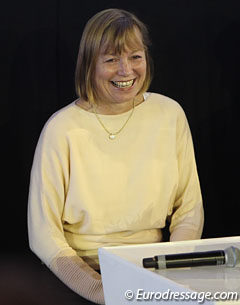 Eva Simeoni absolutely hit nail on the head and addressed a major current-day problem which also affects dressage and makes it even less accessible to the big masses than before. Because of the faster pace of society and high-speed info feed via the Internet, the attention span of the audience has become much shorter as well as the general knowledge of the happenings in the world. Paradoxically the more information available to a reader/viewer, the less informed he seems to be. Simeoni worded it differently, but she was absolutely right: "Thirty years ago the common knowledge about all sports was much broader. People knew who the winners were (in different disciplines)," said Simeoni. "Now because of the internet there is less space (in the newspapers). There is a big gap between the discplines. We only cover soccer soccer soccer and formula one."
Eva Simeoni absolutely hit nail on the head and addressed a major current-day problem which also affects dressage and makes it even less accessible to the big masses than before. Because of the faster pace of society and high-speed info feed via the Internet, the attention span of the audience has become much shorter as well as the general knowledge of the happenings in the world. Paradoxically the more information available to a reader/viewer, the less informed he seems to be. Simeoni worded it differently, but she was absolutely right: "Thirty years ago the common knowledge about all sports was much broader. People knew who the winners were (in different disciplines)," said Simeoni. "Now because of the internet there is less space (in the newspapers). There is a big gap between the discplines. We only cover soccer soccer soccer and formula one."
German Olympic eventing rider Ingrid Klimke is an absolute success story when it comes to attracting sponsors and keeping them by fulfilling their needs. Her professionalism in combination with her outsttanding horsemanship are the key factors. "I have a special team behind me and hired a marketing person. Three years ago we began with Facebook and we now have 180,000 followers," said Ingrid. "My barn is based on sponsors, who allow me to take time for the horses, compete them and finance the barn. We make a network between the press and the shows. For instance, my sponsor SAP gave me a helmet cam to get the spectators more emotionally connected. UVEX had a drone."
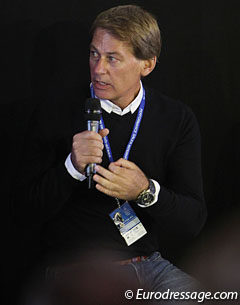 Emile Faurie believes the sport needs to be more understable for a larger audience to grasp it. "Dressage is never going to be a public sport that you can put on the air and attract millions of viewers unless they know what they are looking at," said Faurie. "The public needs to relate to the rider and I want to stay away from the word celebrity. Our sport has a tag of elitist." Faurie believes that the story of a zero-to-hero, like the path Olympic champion Charlotte Dujardin walked, works to promote dressage. "She comes from a working class family and became a champion due to technical brilliance," he said.
Emile Faurie believes the sport needs to be more understable for a larger audience to grasp it. "Dressage is never going to be a public sport that you can put on the air and attract millions of viewers unless they know what they are looking at," said Faurie. "The public needs to relate to the rider and I want to stay away from the word celebrity. Our sport has a tag of elitist." Faurie believes that the story of a zero-to-hero, like the path Olympic champion Charlotte Dujardin walked, works to promote dressage. "She comes from a working class family and became a champion due to technical brilliance," he said.
The hero concept kept returning in the discussion and it didn't take long for the talk to turn to the phenomenon Totilas. "Totilas was the easiest time for me," said Konieczny. "TV jumped on it. Viewers heard about this horse, they saw the show without having an idea of the sport. For tv, you need to create your own celebrity, your own hero. That is all." Eva Simeoni added that "the picture of Totilas was not one of a horse. The danger is to loose onself in these kind of stories."
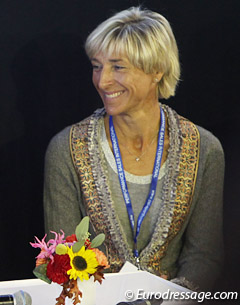 For the written press it's a struggle to present a positive image of certain shows when journalists are treated as obsolote with tv counting as the only relevant medium. "It's all about financing," said Klaus Roeser, who is an FEI Dressage Committee member, a chief selector for the German dressage team, the German dressage chef d'equipe, as well as a show organizer for Paul Schockemohle events. "Sponsors give money, the company wants media. We need to make the sport sexier."
For the written press it's a struggle to present a positive image of certain shows when journalists are treated as obsolote with tv counting as the only relevant medium. "It's all about financing," said Klaus Roeser, who is an FEI Dressage Committee member, a chief selector for the German dressage team, the German dressage chef d'equipe, as well as a show organizer for Paul Schockemohle events. "Sponsors give money, the company wants media. We need to make the sport sexier."
François Kasselmann added that show hosts rely on print media, especially before an event, to bring the people to the show and sell tickets. Möller addded, "we sell tickets based on the riders who come. Dressage riders scratch the day before and more easily than show jumpers do."
Faurie added that show schedules, with classes from morning till night, ring familiarization scheduled at 6 AM in the morning, and of course warming up and competing horses as well as coaching students, sometimes makes it hard to fulfil the wishes of the organizers and sponsors. Ingrid Klimke concluded that "you have to take care of your sponsor as your family, as friends. It's your duty."
Text by Astrid Appels - Photos © Ruchel - Astrid Appels
More on the Global Dressage Forum coming this week